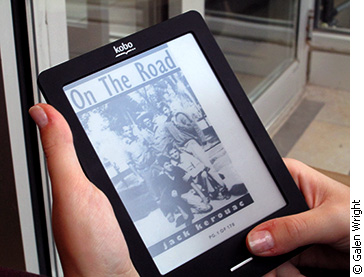Tags
Related Posts
Share This
Death of a book salesman?

Small, portable e-readers such as the Kobo allow users to carry thousands of books with them at any time.
When Amazon launched its Kindle e-reader in 2007, it looked as though the bell had tolled for those who owned independent bookstores. Seven years on, e-readers now allow book enthusiasts to buy and hold thousands of titles in the palm of their hand, while never moving from the comfortable confines of their favourite reading chair. Amazon had dragged the book retailing business into the age of the handheld device, and the final chapter in the biography of independent bookstores looked imminent.
“I’ve stopped going to bookstores because it’s just basically more accessible for me to buy books online and read them on my e-reader,” says Ana Gajic a Carleton University student and avid reader.
Gajic is not alone in her move away from traditional books. The CBC reported that in 2012 Canadian e-book sales were worth approximately $300 million dollars, up from $100 million in 2010.
The ascent of the e-book, combined with rising retail-space rental prices, has had a dramatic impact on Canada’s independent bookstores. The Canadian Booksellers Association estimates that 300 independent stores have closed in the last decade, leaving approximately 1, 500 independent book retailers operating in Canada.
In 2012, Ottawa alone lost three independent bookstores. First, Nicholas Hoare closed its doors in April after the National Capital Commission raised rent on the stores property by 72 percent. Beloved retailers Collected Works and Mother Tongue Books followed suit before the year was out. Then in December, Books on Beechwood very nearly suffered the same fate, but was saved by a last-minute buyer.

Tablet of contents. Carleton student Ana Gajic reads almost exclusively in ebook format, since getting an e-reader in 2012.
Bucking the trend
A year after the closures across the city, a curious thing happened: Troubadour Books and Records opened in the ByWard Market in September 2013.
“It’s ridiculous to think that [hardcopy] books will cease to exist,” says Tom Lee, owner of Troubadour. “I sell used, and my prices more or less match Amazon and e-book prices. I believe there is still a market for affordable books.”
BookNet Canada statistics seem to support Lee’s confidence in the enduring existence of hardcopy books. The non-profit organization, which monitors the Canadian book industry, announced that by the end of 2012 e-book sales had actually stopped growing and reached a plateau of a 15-percent market share of all book sales in Canada. This means that traditional book sales still account for 85 percent of all books bought by Canadians.
So, could it be that there’s hope for independent bookstores in Ottawa and Canada generally? And if so, what does it take to survive in the 21st century?
Survival guide for independents
Observers suggest there may be three main ingredients for continued existence: a carefully selected collection of books, a well nurtured community spirit and vigorous use of online sales channels.
“You have to have a niche,” says Jim Sherman, owner of Perfect Books on Elgin Street. “A carefully manicured selection of books makes independent bookstores viable.”
For Perfect Books that niche is new releases, primarily from the science fiction and mystery novel genres. As testament to Sherman’s belief, most independent stores left in Ottawa try to cater to a particular audience. Book Bazaar on Bank Street and Dragan Tail Bookshop in the Glebe both focus on rare and out-of-print books, while Octopus Books caters to those who lean to the left of the political spectrum. Sherman notes that a store like the now defunct Collected Works, that featured a little bit of everything, is no longer a realistic business model. He adds that you really have to know your audience inside and out.
‘A store like the defunct Collected Works, that featured a little bit of everything, is no longer a realistic business model.’ — Perfect Books owner Jim Sherman
For countless independent book retailers who utilize online selling, this audience no longer stops at city limits. David Rosenbloom of Dragan Tail Bookshop says that when independents partner with online dealers, the whole world becomes their market place.
Online dealers such as AbeBooks (now an Amazon.com subsidiary) are able to create networks made up of thousands of independent retailers from around the world. AbeBooks alone, for example, had over 13,000 vendors in its network before being bought by the online retail giant Amazon. People across the globe can access and buy books from the retailers within these networks. For stores like Dragan Tail or Black Squirrel, this process allows their complete collection to be viewed by the entire world, not just by Ottawa residents.
“It gives us an extra layer of security knowing that we have those online sales there,” says Vaughn MacDonald, co-owner of Black Squirrel Books. “Those sales already pay the rent. Everything that’s sold in the store is just on top of that.”
MacDonald adds that today online sales represent one-third of Black Squirrel’s total revenue. Meanwhile at Dragan Tail, 50 percent of all business is done online.
Ian Lee, a business professor at Carleton University, acknowledges the potential of online selling, but warns independent retailers not to forget their local base. Lee says bookstores must become part of their community and act as a cultural hub where like-minded people can gather, in order for the stores to survive, moving forward.
It was the creation of the communal spirit Ian Lee talks about that helped save Books on Beechwood in December 2012. The long-running independent in Ottawa’s New Edinburgh neighbourhood was on the verge of collapse when Brian Sullivan and two associates stepped in and purchased the outlet from longtime owner Jean Barton. Sullivan had been taking his son to readings at the store for many years and saw the location as an important part of the New Edinburgh community.
Perfect Books and Centretown’s Black Squirrel Books, along with others, have recognized the importance of increased community outreach efforts. Both locations host events such as book signings and concerts on a regular basis in order to connect with their surrounding community.
“I make myself available for book signings with authors; we did eight signings in October and eight more in November,” says Sherman. “More aggressive marketing outside the store is one thing that has really grown our business. It’s something that didn’t use to happen when bookstores simply opened their doors and waited for people to come in.”
There’s no doubt the industry is rapidly changing, but as Mark Lefebvre of the Canadian Booksellers Association points out, independent bookstores adapted to the arrival of big-box stores as well as the advent of online selling. With this in mind, observers are cautiously hopeful that the best-run independents will continue to find ways to survive the growth of e-readers.
“E-readers have definitely reduced sales of books, but they’re not going to wipe out books,” echoes Rosenbloom of Dragan Tail Bookshop. “E-readers compete with the information provided by books, but they can’t compete with the intrinsic value.”
Home-page photo © Melanie Moller.





